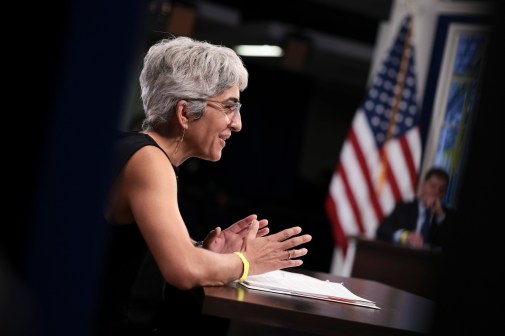OMB wants to support ‘first movers’ to emerging technologies

As the federal government plots its course in the adoption of emerging technologies, the Office of Management and Budget wants to provide air cover for “first movers” to pilot new tech at their agencies, Deputy U.S. CIO Margie Graves said.
“What we do is to look at those new emerging technologies and to find ways that we either sponsor within an agency — call it the ‘first mover’ in a certain arena — and we actually get money to the table or we provide support and air cover and legislation that allows these agencies to adopt and go and demonstrate how these technologies are working in their mission space,” Graves explained at AFCEA’s Law Enforcement and Public Safety Technology Forum.
The Federal Emergency Management Agency is one of those first movers. OMB is working with FEMA to improve its ability to crowdsource real-time information during emergencies. This was spurred, Graves said, by the agency’s increased use of social media during last year’s historic hurricane season that wreaked havoc in Texas, Puerto Rico and elsewhere in the Caribbean “to give them better information of what was happening on the ground and where they might place their resources and what they might address first in terms of recovery for the American public.”
“Within that they had a set of tools and a set of partners they were working with to pull in that data,” she said. “And what they found was the lack of standardization on the toolsets and the lack of standardization on the data they were collecting, and then ultimately what we really worry about is that the trusted partners that are coming to the floor that are supplying you with that social media, are they being hacked? Are they being hijacked? Are they actually providing information that’s going to give you the wrong answer?”
Graves said that the Federal CIO’s office is looking to do the same around government with other agencies. “We’re going to supply money and support and things of that nature to have people demonstrate these capabilities within the agencies and show the use cases and then try to promulgate that across the federal government,” she said.
Speaking more broadly, Graves also pointed to IT acquisition reform and modernized cybersecurity policy as two high-priority policy areas. “There are just so many things in place that stymie us. My acquisition community has become my best friend because I want them constantly at my side to help me make that change,” she said. “Because if I can’t get to these things and I can’t utilize these enabling technologies, then I’m stuck with a great idea an nowhere to go with it.”
On the cybersecurity side, she said, the federal government is living in the past.
“Right now we have some policies in place that send agencies to the wrong point in time in terms of how they adopt cybersecurity technology and how they deliver cloud technologies,” Graves said. “So we’re changing the way we look at our security policy — give a better on ramp for those kinds of things in the future. That includes the Trusted Internet Connection, that includes how we do ‘cloud first’ and how we actually close data centers — it includes a lot of different things.”
For example, it might be time to move past the idea of “defense in depth,” which can position protections at too many IT layers, she said.
“If we can actually turn things on its head instead of talking about defense in depth — which I believe in defense in depth to a certain extent — there are better ways to do things today. Those technologies exist if we can concentrate on the capabilities and the risk profile and protecting at the data layer, and also zero-trust networks and encryption and things of that nature,” Graves said. “I think we will go a long way toward changing some of the restrictions we have in place today, because I do believe that some of those technologies are set up for our betterment in terms of being able to exchange information and to be able to exchange it in real-time. And particularly when there’s a law enforcement situation that is evolving, you have to have instantaneous information. We need to be able to get to the point where those technologies are part of our portfolio and not something we have to struggle to buy.”





